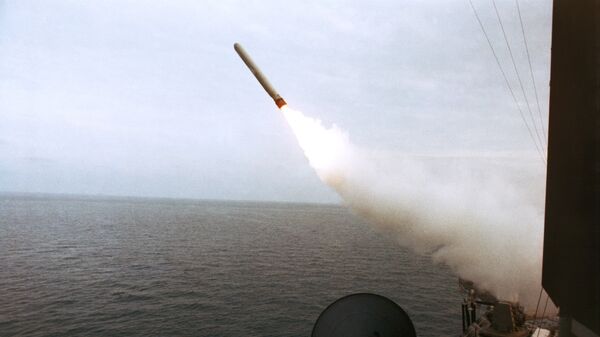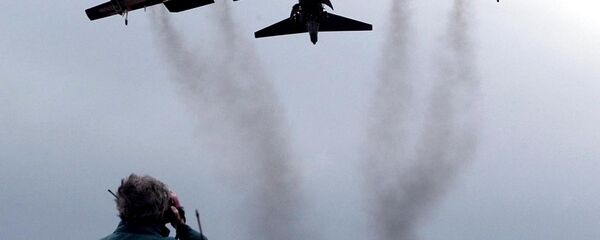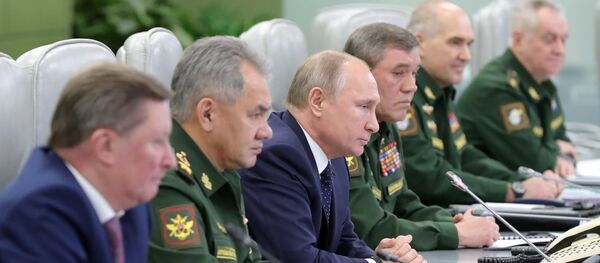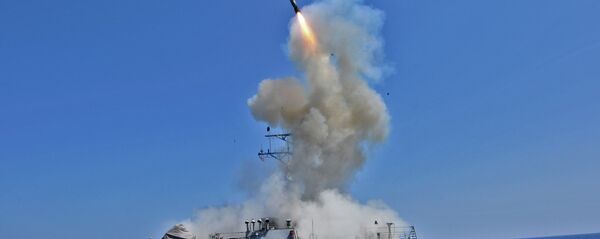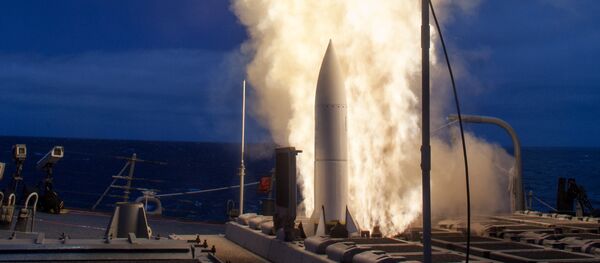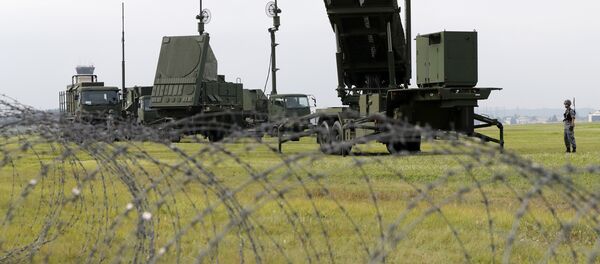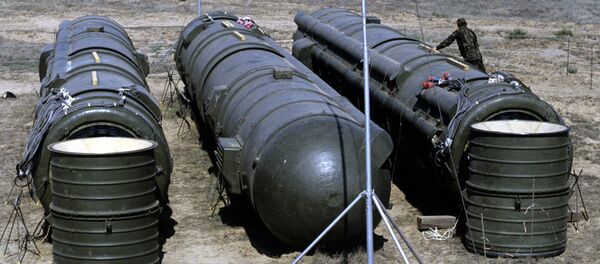On Monday, the Kremlin press service said that Russian President Vladimir Putin had signed a decree suspending Russia's obligations under the INF Treaty until the United States resumed its compliance with the treaty. Putin's decree came into effect on the day it was signed.
The United States formally suspended its obligations under the INF Treaty last month and gave Russia six months to comply with its demands, prompting Russia to do the same. Putin said the country did not want a costly arms race but ruled out any new talks on arms controls, saying all earlier proposals remained on the table.
INF Treaty's Doubtful Future
Gregory Copley, the president of the International Strategic Studies Association, doubted the rationality of preserving the agreement, arguing that it no longer corresponded to present-day realities.
"There is no chance that the INF Treaty can be maintained… The strategic balance has changed, and the INF Treaty only circumscribed Russia and the United States, while allowing the People's Republic of China and other states to move forward with weapons in what used to be the INF 'space'", Copley suggested.
READ MORE: US Lawmaker Urges Congress to Pass Bill Stopping Trump From Leaving INF Treaty
Joshua Pollack, a senior research associate from the Middlebury Institute of International Studies, shared Copley's pessimistic attitude toward the deal's future fate, going so far as to state that the document was already "dead."
"The INF Treaty is dead. It is very clear that the White House does not want it any longer, and is unwilling to heed the concerns of allies," Pollack said.
Miles Pomper, a senior fellow in the Washington DC office of the James Martin Center for Nonproliferation Studies (CNS) of the Middlebury Institute, in turn, said that although he believed there were still opportunities to preserve the agreement, they were unlikely to be used.
"There is still a possibility to keep the treaty, although I do not consider it likely. I see little chance that [US President Donald] Trump's administration will change its policy under the current team. So the only chance would likely lie with Russia's willingness to either engage in independently verifiable flight tests of the contested missile or destroying it as the United States has suggested. That also seems unlikely", Pomper indicated.
Maxwell Downman, a nuclear policy analyst for the British American Security Information Council, in particular, recalled that Russia and the United States had managed to overcome disagreements in times of much more strained geopolitical dynamics.
"There is always the possibility that the INF Treaty can be saved. Even at the height of the Cold War — a deeper ideological conflict than the tension between the United States and Russia today — both sides agreed on the benefits of arms control for their mutual security. Both Russia and the United States should think hard before stumbling into a post-arms control future, consider the benefits of restraint in international diplomacy and make the utmost efforts to save the treaty", Downman suggested.
Gotz Neuneck, a professor of physics and deputy director of the Institute of Peace Research and Security Policy at the University of Hamburg, opined that the remaining five months during which the United States was expected to conclude its departure from the treaty might be used to increase the level of mutual trust between the two sides.
"The remaining five months can be used for a deepened data exchange and reciprocal inspections of the suspected systems… If both sides are willing to preserve the treaty seriously, they can solve that problem easily by reciprocal inspections", Neuneck said.
READ MORE: NATO to Respond if Russia Doesn't Fulfill Duties Under INF Treaty — Stoltenberg
"In return, the United States and NATO have to reassure Russia, that the two Aegis Ashore BMD [ballistic missile defence] sites cannot be equipped with offensive non-compliant cruise missiles but with the planned interceptors. Inspections of the BMD sites can help to reach this goal", Neuneck stated.
No New Missiles to Be Installed
Neuneck then went to speak about a less desirable scenario, in which the parties fail to preserve the deal, and the increasing possibility of new missiles being deployed.
"Officials from the Trump administration said that they do not intend to deploy ground-launched INF-systems in Europe, and in many European capitals, there is no appetite to station new INF-systems on European grounds. There would be also resistance in the population against such plans. It is in the utmost interest of everybody to prevent a new nuclear arms race in Europe", Neuneck said.
"In our conversation with the Russian foreign minister, Sergei Lavrov emphasized that Russia will not be the first to deploy INF-prohibited missiles in Europe. We heard these arguments also in Western capitals. Therefore, it would be groundbreaking if NATO signs with Russia a no-first deployment declaration", Neuneck stated.
However, each expert, regardless of their views on the future of the INF Treaty, doubted that Putin signing off on the INF Treaty's suspension would result in the United States sending new missiles to Europe.
READ MORE: Gorbachev Calls on US to Start Dialogue on INF Treaty With Russia
"There is little likelihood that the United States will deploy INF-class missiles in Europe, or indeed anywhere beyond its own borders in the foreseeable future. In time, the United States may develop such missiles again, but it is unclear what country would want to host them, or what their purpose would be. If the US army should ever acquire missiles of this class, they would probably remain at home in the United States in peacetime", Pollack stated.
Downman, in turn, concluded that it was possible both for Russia and NATO, in the face of the United States, to agree to not deploy any new missiles.
"There is an opportunity for all to exercise restraint in diplomacy and NATO and Russia could mutually agree not to place any ground-launched missiles within striking distance of the territory of the other… Both sides could reject arms racing and demonstrate behaviour that puts NATO-Russia relations on a more sustainable pathway", Downman stated.
Alternative Arrangements
According to Downman, arms control is the most reliable means to manage nuclear risks between the United States and Russia.
"Yet if the INF Treaty is not salvageable, Russia, the United States, and Europeans should take alternate measures to manage these risks. Both NATO and Russia could unilaterally declare they will not to station any ground-launched intermediate-range missiles — conventional or nuclear — in striking distance of the other", Downman said.
Neuneck, in turn, suggested, that the issue should be addressed internationally and take into account other global players.
"If both Russia and the United States fear other states equipped with INF ballistic and cruise missiles (such as China, India or Pakistan), they could develop a future monitoring system to verify the prohibition of INF systems. Another option is to develop a global ban on nuclear-equipped cruise missiles. These weapons are dangerous because they are good for a stalking first surprise strikes against critical high-value targets", Neuneck said.
READ MORE: NATO Preparing Measures if INF Treaty Terminated — Stoltenberg
Pomper, for his part, argued that the difficulty with alternative agreements lied not in drafting them, but in the absence of political will on either side to respect them.
"One can imagine a number of other formulations — a global INF treaty, including China, a Europe only treaty with Russia moving the missiles behind the Urals, as Germans have suggested, amending new START [Strategic Arms Reduction Treaty] to apply to all nuclear weapons. But all of these and maintaining INF would require political will on both sides which is missing. Ultimately, it's not a drafting problem, but a political one", Pomper said.
Copley focused, in particular, on the possibility of involving China in a possible future agreement, saying that Beijing had shown little interest so far in limiting its weapons development.
"The People's Republic of China [PRC] does not seem ready to acquiesce to any constraints on its weapons development, including space weapons. That being the case, only the natural mechanisms of the balance of power will serve to act as a spur to force the PRC to participate in a new round of multilateral treaty arrangements", Copley said.
Dr M. V. Ramana, the Simons chair in Disarmament, Global and Human Security at the Liu Institute for Global Issues at the University of British Columbia, suggested that international consultations should be launched to figure out what an appropriate treaty would look like.
He added that such consultations would help de-escalate tensions and called for the INF treaty to be respected even under the current circumstances.
The views expressed in this article are solely those of the speakers and do not necessarily reflect the official position of Sputnik.

